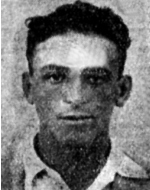Topman, Zvi
Son of Chaya and Menachem-Mendel, was born in 1923 in the city of Moglenitz, Warsaw, the capital of Poland, and grew up in an atmosphere of assimilation in the home of his father, the doctor. At the beginning of the Second World War, he traveled to Russia where he worked and studied. In 1941 he volunteered for the Red Army and was wounded in the war. In 1946 he returned to Poland and underwent pioneering training in the city of Wroclaw. Zvi rejected his brother’s entreaties to remain in Poland, crossed borders in the Bericha route, immigrated to Israel on the ship Theodor Herzl, and after a physical struggle with the British he was deported to Cyprus. Six months later he was allowed to immigrate to Israel because of his illness. He was taken straight to the hospital and ordered to report to the Atlit camp after his recovery. Zvi escaped from the hospital, arrived at Kibbutz Afikim, joined a group of immigrants, his friends from the illegal immigration movement, and adapted himself to growing vegetables. “If we were trained in the Diaspora and had weapons in our hands, we would not be slaughtered like sheep,” he told his commander. When the War of Independence broke out, Zvi asked the commander of the place to recruit him. He told the commander, “I and my brother remained from our entire family, who were exterminated in the sight of the cattle cars, and if we had guys with weapons now, and now you want others to go to battle, I do not want to really fight the enemy, I know that I might be killed, but I will forever despise my life knowing that I could fight and not fight because I was afraid of death. ” Finally, the commander responded to his pleas and transferred him to combat duty in the Golani brigade. Since then he has participated in almost all the activities in the area, fighting in the bridge, in the plant, in the Arab Sejera, and everywhere he treated dangerously and under a shower of fire he crawled to put food in a shelter behind stones to bring food to a detached and attacked point, Such. When he was offered leave, he refused to accept it and leave his comrades in battle. On the 10th of Elul 5708 (10.9.1948) he went out with a foot patrol to patrol near the Jib-Yosef outpost, which was caught by the Kaukji gang and fell there, and was mentioned in the booklet “Ten” – a memorial file of Kibbutz Afikim. On November 3, 1953, he was laid to rest in the military cemetery in Degania Aleph.
